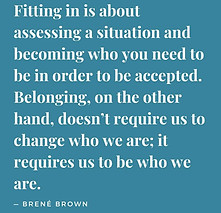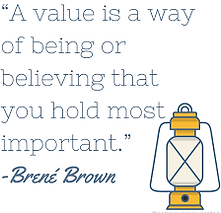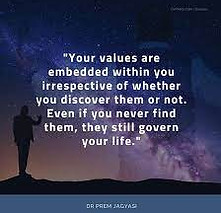
Capstone Project:
Value-Aligned Interviewing
When our core values conflict with those of an organization we belong to, that disconnect leads to increased stress, decreased happiness, and a loss of belonging. Fit matters, and it is time that we, as prospective employees, took an active role in determining if a position is right for us.
Project Overview, Proposal & Background

When we accept behavior at work that we would not accept elsewhere, we essentially create a life in which we exist within two different worlds, each operating on its own value system. We then must choose to either ignore the contradiction in values (and their resulting behaviors), or choose to rationalize our behavior while within the organization regardless of how it conflicts with our values. With either choice, the discord resulting from the split in values results in the physical and mental malaise so common in today’s workforce. Parker Palmer defines a divided life as one in which our inner and outer works are not in harmony, pointing out that when the demands of the institutions (families, organizations, or communities) we inhabit are at odds with our hearts, it can become pathological, and can only be overcome through finding a new center for our lives.
"Fit" is a buzzword that can be found on just about every organizational bingo card, but it is a concept that is typically used unidirectionally - as in, is this prospective employee a good fit for our organization? Do they share our values and will they internalize and adhere to our mission and vision?
After twelve years as an education professional and nearly a decade in front-line customer service, I have seen first-hand the effects of burn-out, high turnover, and a lack of value-alignment has on individuals and organizations. My goal with this project is to provide applicants with resources which will assist them in taking a more active role in the hiring process and ownership in discovering belonging within their communities and organizations. Click here to read about my project overview & proposal as well as a brief background of relevant literature.
Determining our Values

Before you can determine whether an organization or community aligns with your core values, you must first determine what those values are. There are numerous quizzes you can take and books you can read to help you hone in on the values that most deeply define you, and I encourage you to do some of your own research. And keep in mind that we, as humans, are constantly evolving. Each experience we encounter, the new wisdom we internalize, the people who touch our hearts and souls - these things change us, if we are brave enough to let them. So while you may have core values that remain with you through your whole life, others may change as you do. Ongoing self-reflection allows us to know more and become more - more authentic, more open, more wise.
Two tools I have found to be useful and meaningful are the Schwartz Theory of Basic Values that was a part of my Gonzaga curriculum, and a personal values test I found online. The question as to whether or not there are true universal values and ethics is highly debated, as the role of culture as well as dominant gender and class becomes better understood and widely recognized. Rather than postulating universal norms of good, the Schwartz theory identifies ten core values which are recognized across cultures, and digs into the relationships among the values. The online Personal Values test allows you to identify through gut reaction and comparison your core values out of 59 possibilities identified through their research. Click here to learn more about these two tools, including my experience.
Sample Interview Questions

How do organizations and communities communicate and live their values? Mission, vision, goals, handbooks, bylaws, policies & procedures are all tools used to create and sustain a values-based culture. But culture is so much more than words - it is the design of our offices and buildings, the way we interact with each other inside & outside of work, regardless of who is watching, it is how we react to the the unknown and unexpected, whether that be a personal tragedy or a global pandemic. Just as we, as individuals, must determine our core values and aspire to live and life in alignment with them, organizations and communities must determine theirs and work towards developing an environment in which they are clearly demonstrated and protected. The hiring process, specifically the interview process, is key for both individuals and organizations.
My unique CV history has afforded me the opportunity to be a part of over 100 interviews over the past 20 years, and this project has allowed me to combine my experience with the knowledge I have gained through the ORGL program to create sample values-aligned interview questions for applicants as well as offer some values-driven suggestions for answering common interview questions. While my specific experience has been in the fields of front-line customer service, non-profit leadership, and education, value-aligned interview strategies can be utilized in any field.
Click here to discover the sample interview questions I have crafted, along with explanations of the core values they represent.
Manifested Experiences & Competencies

The most common response I receive when I share with people that I went back to school is for them to seek a deeper reason or purpose in my decision. Some version of, "what are you going to do with your degree?" If you checked out my CV you know that I spent ten+ years in education, and have now spent nearly that long in hospitality. Upon deciding that it was time to take a new step, I decided to do so in a deliberate and values-based way.
While working on this project, a number of possibilities have appeared. I applied, and was accepted to, the Doctoral Program in Leadership Studies at Gonzaga. I have applied to become an Adjunct Instructor at our local technical college, and I have applied to (and interviewed for) a non-profit Executive Director position. My intention is to utilize value-aligned questions both in my interview (hopefully, interviews) and my decision-making process. I don't know what my next step will be - but I'm loving the journey, in large part because because this program and this project are helping me identify and crystalize the future that is right for me. I'll keep you posted!
To manifest is to put aspirational ideas and thoughts into practice. To read more about how I am putting my knowledge into practice and truly manifesting my values and competencies - click here.



